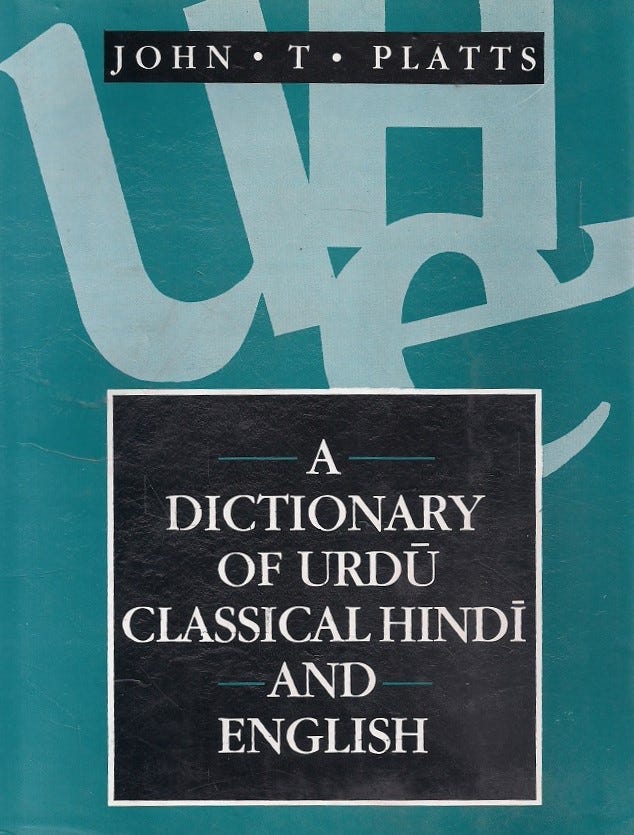Is the Indian diaspora a “living bridge” between [your country] and India? Or is it unsettling that states feel they can suddenly call you up into service as part of their bilateral alliance-building efforts? What about when political parties court you as part of a vote bank they want to capture but barely understand? I found it pretty strange when I first realised that I was now a member of a politically valuable voter group that is also a “national asset,” i.e., the “Indian diaspora,” in 2016 - when I received a letter from my local Australian member of parliament addressing me in Hindi. Now, I’ve watched a few Hindi films in my time, but I do rely on the Malay or English subtitles to help me get through them, so Hindi isn’t a great choice of language to try to flatter me in. In fact, I only learned to read Hindi as an undergraduate at ANU, and I had to get my dictionary out to the read the letter I received. I like Platts and recommend it to learners. Anyway, I wrote about that strange experience in an essay in the Griffith Review. As usual, if you can’t access it, get in touch and I’ll help you.
Rocky, Rani, and Gayatri Spivak?
While I didn’t grow up reading Hindi, I did grow up reading post-Marxism, postcolonial studies, and Subaltern Studies in English. That’s an Indian diaspora experience too, right? Maybe that’s why I laughed when I watched the dumb, but genuinely funny, film, Rocky aur Rani ki Prem Kahani, on Amazon Prime. The film sets up ludicrous stereotypes, which audiences recognise despite how silly they are, and sends them up mercilessly. As a result, Rocky was hilarious. He’s a bro and a PUPY (Prosperous Urban Punjabi Youth), who’s into cash, carz, gymz, girlz, and beatz, and generally enjoying the brief stage of life before PUPYs turn into whisky uncles. But even funnier was the film’s portrayal of the Bengali intellectual type, i.e., the type that wrote practically everything I read as an undergraduate. In fact, I suspect Rani’s mum in the film might be Gayatri Spivak. Anyway, someone’s getting the jokes, as according to media reports, it was diaspora audiences that made this film a hit. Well, I’m not trying to turn this newsletter into Stardust magazine, but I will say that maybe the “living bridge” can do more than just the 3Cs of “cricket, curry, and Commonwealth?” Swap the third C for critical theory, maybe? Or maybe we’re laughing in part because we recognise that strand of theory’s all passe now? The film’s Bengali intellectual is lambasted as an out-of-date product of British rule. Unlike the PUPY, whose bad English marks him as an authentic postcolonial. Ouch.
You can tell the bad girls by their Western names
Diasporas aren’t simply bridges, of course, but vast, sprawling things that go in every direction. We didn’t all just suddenly appear in Parramatta ten years ago, you know. Many of us have long diaspora back stories, including another person I really enjoyed meeting at the OzAsia Festival - Saras Manickam, the Malaysian author of the short story My Mother Pattu, now available in the collection pictured above. I grabbed the book while I was in Adelaide and read it all in one day when I got back to Canberra. All its stories are sharp, critical, and detailed on how complicated it can be to live your whole life as a member of a highly diverse, permanent minority. Full of stories about growing up Indian in Malaysia - and trying so hard to do the right thing while constantly experiencing racism - this one’s a great book. I loved the references to watching “bad girls” with names like Dolly and Rita get up to no good in the Tamil films Saras grew up watching. There is a Hindi film equivalent, of course, who I grew up watching, and whose story arc usually serves as a lesson that the “family values” girl is the one to emulate instead. Well, I guess the ex-PUPY whisky uncles have to be married to someone, right?





